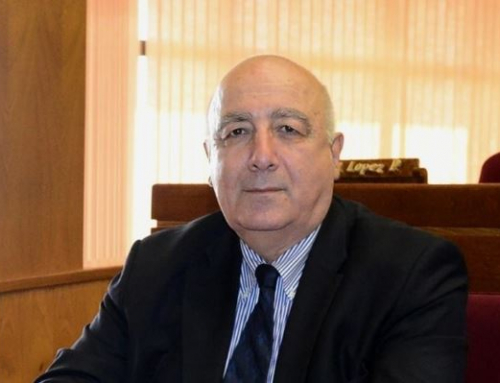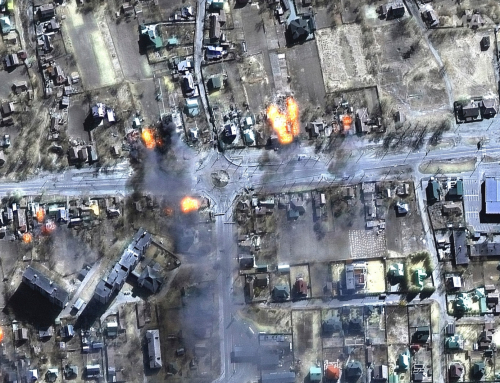Even as Europe and the United States encourage the countries between Russia and the West to adopt a “both/and” approach to relations with the two and in many cases criticize those governments which don’t, Moscow has signaled that in its view, these countries must make an “either/or” choice, increasingly demanding that the former Soviet republics reduce or even cut ties with the West as the price of good relations with the Russian Federation.
Such demands reflect Moscow’s growing self-confidence that it can do so both because of the difficulties many of these countries face and because of the West’s own desire to develop relations with Moscow, its shift in focus away from the former Soviet space, and its all-too-frequent failure to embrace and support some of these states when they find themselves in difficulty with the Russian government.
In Europe and the United States, Moscow’s new demands are viewed as disturbing but not yet at least the basis for any concerted action in support of these countries and against the Russian Federation, all the more so because an increasing number of people in Western capitals recognize that Moscow has its own problems that make such demands ultimately if not immediately difficult if not impossible for it to realize. Twenty years after the end of the Soviet Union, the West has neither the resources nor the focus nor, at least in its own view, a reason for adopting a hard line against Moscow. And because of that, its leaders routinely urge the governments in the region to work for a cooperative relationship with Moscow, however outrageous the Russian government’s actions against their countries may be.
There is as yet little recognition in the West of the extent to which this unspoken – and sometimes passionately denied – agreement to recognize a Russian droit de regarde across all of the former Soviet space except the Baltic countries — which are members of both NATO and the European Union — is not only encouraging the worst elements in Russia rather than supporting the best but undermining both the standing of the West in the post-Soviet states and more generally and hence the ability of the West to promote changes toward democracy and freedom in these countries. But as ever more officials and commentators in these countries have recognized, that is a reality with which their governments and peoples at least for the present have to cope.
Not surprisingly, this new reality both in Moscow and in the West has split the political elites of almost all these states. Some in these countries argue that they must stand up to the Russians no matter what and engage in acts of brinksmanship that will force the West to come to their rescue and embrace them. But other insist that given their own relative weakness and Moscow’s new insistence, they have no choice but to come to terms with what Moscow wants in the hopes that such a display of a cooperative attitude will at a minimum cause Moscow to reduce its pressure on them and at a maximum to become more cooperative on issues that matter to these countries.
Each of these two groups is encouraged by the reactions they receive in the media. Those who engage in brinksmanship can always count on positive coverage from certain newspapers and television networks in the West which are only too pleased to support at least verbally those who are prepared to stand up to Moscow. They can also count on sharp criticism from the same sources of any in these countries who propose to develop a more cooperative relationship with Moscow. Indeed, these outlets are likely to describe those who engage in such things as appeasers or worse.
At the same time, those who show a more cooperative face to the Russians can count on praise not only from the Russian government and its media but also from those Western outlets, always more numerous than one would like, which believe that any criticism of Russian statements let alone opposition to Russian actions, however offensive, will throw the world back into a new Cold War.
No country has suffered more from this divide than the Republic of Georgia and no country has better reasons from escaping from an increasingly sterile debate between those who think that Western media support for their brinksmanship will lead the West to change and bring Georgia into NATO and the European Union, something that isn’t going to change anytime soon if ever, and those who believe that Georgia has no choice but to defer to Moscow on all things as the price of maintaining a diminished but nonetheless national survival, something that need not happen if Georgia and its leaders play their cards right.
But for Tbilisi to do that requires both a clear-headed analysis of what the current facts on the ground, as diplomats like to say, really are rather than as they are suggested by one or another set of commentators, and an appreciation of Georgia’s own remarkable resources, an appreciation that will be possible if and only if Georgia is prepared to think the unthinkable. That in turn will help Tbilisi to focus both on what is possible and to recognize that Georgia has a chance to exploit both the weakness of both and make use of an old principle from the Oriental martial arts by turning the strengths of their opponents against them.
An article in Moscow’s “Vzglyad” newspaper this past Monday provides a useful way in to some of these issues. Denis Dvornikov, director of the Open Courts Committee and a member of Russia’s Social Chamber, provided some very useful answers to the questions — What does Russia want from Georgia? And what does Georgia want from Russia? – before suggesting the kind of thinking the unthinkable with regard to the future status of Abkhazia and South Ossetia (vz.ru/opinions/2013/3/25/625864.html).
Dvornikov usefuly suggests that Moscow has painted itself into a corner with excessive anti-Georgian rhetoric, a rhetoric it has employed for domestic purposes without much thought to its long-term interests. In his words, Moscow must now admit to itself that “Russia needs a Georgia that has preserved its special features and international independence as much as possible.” And that it is in Moscow’s interest that Georgia have a developed economy and be flourishing demographically.
Why is that? Because, Dvornikov says, Georgia is “the key outpost of Orthodoxy in the Caucasus and the central link in the Eurasian Christian axis.” If Georgia were to collapse as the result of either internal unrest or further military actions, that would mean “the loss by Russia of the North Caucasus” and would become a powerful stimulus for [Russia’s] geopolitical competitors,” both separately and altogether. And because of Georgia’s location, Tbilisi’s decisions on transportation and communications links will play a major role in Russia’s relations with the two other countries of the South Caucasus and with Turkey and Iran beyond them.
Few Georgians would make such an argument. Nor would they expect to hear it from a Russian or to recognize, as Dvornikov does, that Georgia’s efforts to participate “in Euro-Atlantic projects” – a Russian euphemism for NATO and the EU – thus “should not be conceived as challenges to Russia.” Indeed, by helping Georgia to survive, they have the effect of helping the Russian Federation to survive as well. That observation doesn’t mean that Moscow will welcome such moves at least in public, but it suggests that Georgia’s pursuit of them will not kill relations with Russia, as some fear and others hope.
What Georgia wants is clear as well, Dvornikov suggests. It wants its territories back and its sovereignty restored. But at the same time, “one can with certainty say that Georgia is interested,” however strange this may seem, “in a strong Russia.” Even after the August 2008 war, Georgians understand that for them, “the weakening of Russia and also the ideological victory of the internal opponents of the Russian Orthodox Church would be a real catastrophe.” Moreover, they know they need access to the Russian marketplace, and they know that their geography gives them real advantages. “Transit between Russia and Armenia is not only about profit but is a factor of stability.”
Despite this, Dvornikov continues, and the fact that “about 80 percent of Georgians want the restoration of relation with Russia, about 70 percent continue to view [Russia] as a military threat.” And it is that perception which leads many of them to pursue precisely the opposite goals that Moscow would like, yet another example of the security trap many countries find themselves in when the direct pursuit of their goals subverts them and only an indirect approach gives any promise of success.
The Moscow writer notes that “Georgians do not want another war” of any kind, including one directed against Iran. Consequently, Dvornikov proposes that the Georgians should tell Moscow the following: Russia should provide “a stabilizing level of influence in the Caucasus” but not view “Eurasian undertakings as hostile and dangerous” all the more so because “Georgia is interested not only in Russian markets but in investment programs.” It is “interested in expanding inter-church dialogue and the support of Orthodox culture in Russia.” And it is interested in having Russia serve as “a guarantor of peace in the Caucasus and Central Asia.”
But what does all this have to do with Georgia’s key goal, the recovery of Abkhazia and South Osetia? As Dvornikov points out, “to expect compromises on this question is difficult.” But there is a way to approach the issue which gives promise and that is to redefine it, focusing on the common interests of Russia and Georgia in both places rather than the ways in which the current status of the two divide Moscow and Tbilisi. Those interests are two-fold. On the one hand, neither side wants a new military conflict. And on the other, both fear what might happen if one or the other of these places becomes a seedbed of Islamic violence.
Today, Dvornikov continues, “Russia is rapidly losing control in Abkhazia” with the departure of its Russian residents. There is “an active Turkification of Abkhazia,” which “if it continues,” means that “Sukhumi risks becoming Prishtina and Abkhazia a new version of Kosovo, which would become not only an obstacle to Russian-Georgian dialogue but a threat to both countries.”
Both capitals are concerned about what is going on in Daghestan and the other republics of the North Caucasus, the Moscow writer says. Both see Islamization across this region as a threat, including in Abkhazia and South Ossetia, and while Dvornikov doesn’t say it, both can certainly count on the understanding and support of the West in taking steps to contain Islamist extremism, given that concerns about that rather than about relations within the former Soviet space predominate in Western capitals now.
What is important for everyone to understand, Dvornikov concludes, is that “time is working against both Moscow and against Tbilisi,” and in that situation “mutual compromises,” including on the most sensitive issues, “are not a sign of weakness but a display of an instinct for self-preservation of two peoples” and two countries.
Far more could be said both about Georgia and Russia and about the role of the West than Dvornikov had space for in his essay. But even using it as the basis for reflection, Georgians should quickly recognize that they have some real advantages if they don’t press them too hard and publically and some real disadvantages that they can overcome if they redefine them in terms that can lead to cooperation.
There are at least five conclusions this suggests. First, Georgia is not as weak as it appears nor Russia as strong as it claims, and that means that Tbilisi can act with greater confidence and continue to pursue both/and rather than falling into the trap of assuming it must succumb to either/or thinking.
Second, despite what many Georgians think now, the West and Russia are likely to find common ground on Abkhazia and South Osetia if their future is defined in an Islamist threat. For the first time since the waning months after the August 2008 war, Georgia thus has a chance to recapture the public high ground in the West, not by repeating its demands but by showing itself capable of working in a direction the West cares about.
Third, Dvornikov is absolutely right to point to the centrality of the Russian church in all this, and Tbilisi must recognize that Georgian Orthodoxy and the leader of the Georgian church must play a significantly larger role in Georgian-Russian relations. Moscow may ultimately be making a mistake by banking to heavily on its Patriarchate, but it is a bet that Tbilisi can call, raise and win.
Fourth, as everyone says, Georgia lives in a bad neighborhood, one it wouldn’t choose if it had the chance. But it is also one that gives Tbilisi remarkable leverage because of its control of land routes and because of the growing importance of Turkey and the Caspian states internationally. The very best hotels and banks may trump the very best tanks in this century, as Tedo Japarizde has said, but it is also true that the very best rail lines and pipelines can continue to count as a country’s best friend.
And fifth – and this is the most important step of all – Georgians need to escape their own either/or thinking, assuming that they must be part of the West or will be subordinate to Russia. They are fated by geography, history, and politics to be both, whatever they or the Russians or the West may think. That is not an easy position to be in, but it if they will think outside the categories they now are imprisoned within, it will give them a remarkable chance to exploit the views of their opponents and advance Georgia’s own.






Where is proof of this so called “Turkification” and “Islamization” of Abkhazia and Ossetia? I highly doubt that there is any danger of either of these regions becoming outposts for radicalism of any sort. Not sure why these points were even inferred. BTW, it is also ironic considering what Georgia was for the overwhelming majority of its past: a Shi’a suzerainty of the Persian Empire.